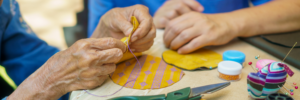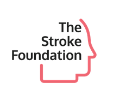Uncertainty can be a large part of the stroke recovery journey. After a stroke, you may find yourself asking questions about what comes next, when will you regain your strength and mobility, why did this happen, and more. Every stroke is different and every recovery journey is different — there is no right or wrong answer to any of those questions.
The last ten months or so have been a test of our mental and physical health, as well as our ability to cope with change and adapt quickly. The COVID-19 global pandemic has changed almost every aspect of our lives and we are now faced with the challenge of learning how to get back to living life while staying safe and healthy.
Those going through stroke recovery have had to put a stop to physical therapy sessions, mental wellbeing support, among other essential recovery activities. Survivors and caregivers alike have had to find a new routine to stay motivated and encouraged while the process of recovery slowed down.
Coping with the uncertainty of your stroke recovery and the current global situation can be overwhelming, but there are things you can do to help you take it one day at a time:
Changing your focus
There are things we can control, and others we can’t. Stroke recovery is mentally and physically challenging, and to some it may feel like it will never end. Some survivors live with the constant worry that they’ll have another stroke, or they may not be able to walk or talk again. It is perfectly normal to ask yourself those questions, and it is important to process those questions. For example:
- “I’m afraid I will have another stroke.”
- Ask yourself: Am I taking all my medication? Have I spoken to my doctor about why I had a stroke and what I need to do to prevent another one?
- Reflect on: you are alive and doing what you are supposed to be doing to prevent a stroke. Trust in yourself and those around you to help you stay healthy while recovering.
- “I have been recovering for years and I’m losing hope.”
- Ask yourself: Have I spoken to my physical therapist about my progress? Is there anything else I can do to help my recovery?
- Reflect on: stroke recovery can take many years, it is a process as unique as you. Think about when you started your recovery and where you’re at now — the progress you’ve made from then until now is worthy of celebration.
Allow yourself to feel
It’s important to feel your feelings — all of them. Giving yourself permission to be sad, angry, frustrated, anxious, or whatever it is you are feeling, will help you process that emotion. Give yourself 60 seconds to feel your emotions, then reflect on what made that emotion come up.
Learning what makes us feel a certain way and how we can manage it helps us be better at controlling our emotions and reducing stress and anxiety. Practicing gratitude journaling, on your phone or on paper, can also be a useful way of learning how to process your emotions.
Staying active
Managing stress and anxiety is a big part of coping with uncertainty. The best way to help soothe a stressed out mind is by making it work — do a puzzle, read a book, take a walk, listen to music, whatever helps you take your mind off of whatever is bothering you.
Even if it’s going to sit outside for a few minutes and breathing different air, breaking up your day with small ways of staying active will help you feel less stressed or anxious.
The ability to cope with uncertainty is not something we are born with; we are constantly learning how to do so through the ups and downs of life. Sometimes, uncertainty helps us find new ways to live, new things that make us happy, and makes us more resilient.
Life is full of challenges and we are all learning as we go. Find what makes you feel good and happy, what brings you joy and wellness — use the strength and resilience you’ve built up to achieve your best mental health possible.




